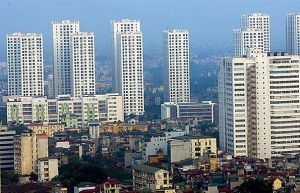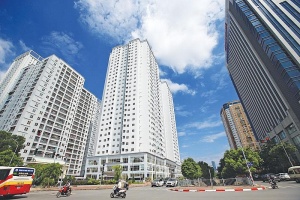Foreign buyers face property tax limbo
According to Thu Duc Tax Department in Ho Chi Minh City, some non-nationals want to transfer the rights and obligations of a long-term leasing contract of apartments to another party. However, there is a sticking issue in terms of what kind of tax must be imposed for this transaction. In one case, a foreigner who has not been named said that he should have a transfer tax applied which imposes a rate of 2 per cent of the unit’s value, which is the regulation in most cases. However, the tax authority claims that this case must be imposed with the tax for the leasing contract, which is now imposed at 10 per cent of the unit’s value.
 |
| Clarity is needed on certain transactions that involve a third party, Le Toan |
In 2015, this foreigner signed a long-term leasing contract with Green City Development JSC to lease an apartment for 48 years from the day the unit was handed over in June 2020. The contract stipulates that the lessee will be able to transfer this contract to a third party. In addition, after completing the procedures for the leasing contract, the third party will be entitled to move to sign a purchase contract with the lessor.
However, Thu Duc Tax Department said that this man’s income is determined from leasing asset activities as prescribed in Circular No. 40/2021/TT-BTC dated June 01, 2021 of the Ministry of Finance providing guidance on value-added tax, personal income tax, and tax administration for business households and business individuals, which is subject to the tax rate of 10 per cent on the transfer price. The department has asked the General Department of Taxation for further instruction.
A source from Thu Duc Tax Department said that the above case was not the only one. “Recently, almost all transaction contracts from foreigners involve the 50-year leasing contract, because the cap permitted for actual sales to foreigners (of 30 per cent) in many projects have been reached. There have been many more foreigners sending their dossiers for paying this tax, but we cannot solve the issue right now as we must wait for further guidelines from the General Department of Taxation,” said the source.
According to one insider, current projects such as Gateway Thao Dien, Thao Dien Pearl, and The Nassim in Ho Chi Minh City have reached their 30 per cent cap of selling outright to foreigners, so developers instead offer foreign buyers a long-term leasing contract, which is usually 50 years with a one-time payment.
Duong Thuy Dung, executive director of CBRE Vietnam, told VIR that depending on the case, if a foreigner buys a house with a 50-year ownership contract and signs a purchasing contract, they will be subject to a transfer tax of 2 per cent. “If they sign a long-term leasing contract instead, they will not be issued an ownership certificate, so it is not considered a transaction deal, and as such, no transfer tax will be applied. But the leasing tax will be levied instead depending on the current tax framework issued by the Ministry of Finance,” Dung said.
However, a long-term lease contract will not have the same benefits as a purchasing contract, such as mortgage rights. “Nothing will change if the buyer signs a long-term leasing contract and then continues to use that apartment. The problem only manifests when this buyer wants to transfer to a third party and wants to be charged a transfer tax, instead of a leasing tax. This is a shortcoming which should be clarified,” Dung explained.
Lawyer Tran Duc Phuong from the Ho Chi Minh City Bar Association said that, due to different reasons such as limited sales to foreigners, the non-nationals cannot authenticate passports or other personal documents. Developers and foreign buyers in this case signed a long-term lease contract which stipulates that foreign guests are entitled to switch to signing a purchase and sale contract when they meet all requirements.
“Thus, the essence is that the developer sells houses to foreign customers, but still waits for enough conditions to sign a purchase contract. This is a contract for the transfer of the real estate, even if it is only formed under a leasing issue. If the foreign owner no longer needs to use them, they are legally able to transfer the rights and obligations of that unit to a third party,” Phuong said.
But Phuong emphasised that if it is a leasing contract, under the current law, they cannot transfer to another person. That is why in many current transactions, the buyer would work with the developer to terminate the old lease contract so that the developer can sign a new contract with the third party.
Kent Wong, partner and head of Banking and Capital Markets at VCI Legal, said that even though a contract between a developer and a foreigner is called a “leasing contract”, in reality, it is actually a real estate transfer contract.
“For other commercial lease contracts, 10 per cent of tax will be applied after signing the contract. However. for the leasing contract, the developer transfers the land use right to the foreigner in accordance with the Law on Real Estate Business. The foreigner then becomes the owner of such land/unit for 50 years. So this leasing contract would be considered a real estate transfer contract and should apply a tax of 2 per cent of the total transfer value,” Wong told VIR.
According to statistics of the Ho Chi Minh City Real Estate Association, from 2015 to 2020, around 16,000 apartments were sold to foreign organisations and individuals, who were mainly Chinese, South Korean, Japanese, or Singaporean.
 | Finance Ministry proposes new housing tax The Ministry of Finance has proposed a tax on houses depending on their construction value as part of a draft law on property tax. |
 | Effective spending required for people’s acceptance of new property tax proposal The Ministry of Finance has proposed imposing a new tax on people who own property worth VNĐ700 million ($31,000) or more. |
 | Further scrutiny required before introducing property tax overhaul To curb land speculation, some proposals regarding land-value taxation and progressive taxes based on the number of owned properties have been suggested, which experts believe could make it more costly for speculators to hold onto vacant sites in Vietnam. |
 | No policy for draft law on property tax The Ministry of Finance (MoF) made an announcement on March 14 stating that there is currently no policy in place to prepare a draft law on real estate taxation. |
 | Considering more appropriate taxes for the real estate sector The Ministry of Finance has been gathering opinions on housing and property taxes, which is attracting interest, including that from domestic and foreign experts. |
What the stars mean:
★ Poor ★ ★ Promising ★★★ Good ★★★★ Very good ★★★★★ Exceptional
Related Contents
Latest News
More News
- Construction firms poised for growth on public investment and capital market support (February 11, 2026 | 11:38)
- Mitsubishi acquires Thuan An 1 residential development from PDR (February 09, 2026 | 08:00)
- Frasers Property and GELEX Infrastructure propose new joint venture (February 07, 2026 | 15:00)
- Sun Group led consortium selected as investor for new urban area (February 06, 2026 | 15:20)
- Vietnam breaks into Top 10 countries and regions for LEED outside the US (February 05, 2026 | 17:56)
- Fairmont opens first Vietnam property in Hanoi (February 04, 2026 | 16:09)
- Real estate investment trusts pivotal for long-term success (February 02, 2026 | 11:09)
- Dong Nai experiences shifting expectations and new industrial cycle (January 28, 2026 | 09:00)
- An Phat 5 Industrial Park targets ESG-driven investors in Hai Phong (January 26, 2026 | 08:30)
- Decree opens incentives for green urban development (January 24, 2026 | 11:18)

 Tag:
Tag:





















 Mobile Version
Mobile Version